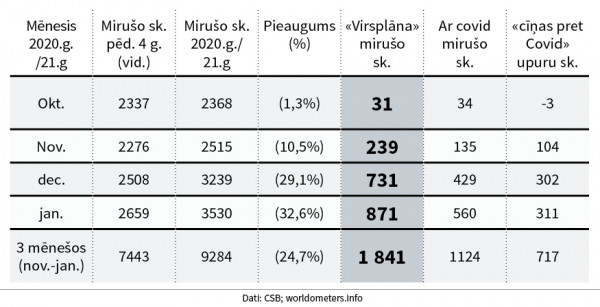Excess deaths in Latvia significantly exceed the number of deaths with the SARS-CoV-2 virus
From the start, I want to say that I do not want to be misunderstood. I do not intend to campaign for or against stricter or, on the contrary, lighter restrictions. I have simply compiled some statistics, which I dared to interpret because I know from experience that not everyone has the time and desire to dig through the tables of numbers.
Since November, the number of excess deaths (more than on average in other years) in Latvia has significantly (more than could arise from statistical uncertainty) exceeded the number of people who have died of Covid. This means that the "fight against Covid" itself has had a negative impact on people's overall health and has not benefited the rest of the healthcare system.
Of course, this does not mean that the introduction of lighter restrictions in the "fight against Covid" would lead to lesser mortality rates. We cannot know that, but these statistics show that many restrictions, including restrictions on medical examinations, have had very serious consequences.
Before we look at the issue further, I would like to emphasize two more things. First of all, remember that not everyone who died while having Covid died because of Covid. In many cases, the cause of death was different, but since the person was infected, he was included in the number of Covid victims. In other words, the increase in mortality caused by the "fight against Covid" is even greater than in the calculations mentioned in the table.

Secondly, I would like to emphasize in particular that people's overall health has been affected not only by the limited availability of health care but also by other restrictions introduced as part of this fight. The constant feeling of panic (stress) in society could not fail to impact people's general health. Like the fact that many older people were subjected to severe loneliness (general restrictions allowed them to be visited much less often than they would like, because people could always say, "We have to protect you, so we can't visit you"). This is not just for the elderly. People of all ages faced different social challenges, and according to the law of large numbers, these difficulties increased the overall mortality rate.
I have to admit, I did not intend to investigate this issue specifically, but I got interested when I read this Reuters article, which summarizes Eurostat data on excess mortality in different countries in 2020. According to these data, it turned out that in Sweden, which had its own anti-pandemic strategy different from other EU countries, the number of deaths in 2020 was only 7.7% higher than the average number of deaths in the last four years. According to this indicator, Sweden was only 21st out of 30 European countries. The largest increase in excess mortality is observed in those countries where the strictest limits have been set - 18.1% in Spain and 16.2% in Belgium.
The low excess mortality rate in Sweden is also confirmed by the UK’s Office for National Statistics, which has also taken into account differences in age structures and seasonality of mortality in its calculations. According to British estimates, Sweden ranks 18th out of 26 in terms of excess mortality rates. Poland is at the top of the table, followed by Spain and Belgium.
In order not to make these data seem one-sided, it should be noted that in Sweden's neighboring countries - Denmark, Finland and Norway - these figures are much better. However, as there was no word about Latvia in the mentioned Reuters publication, I made the necessary calculations for our country myself. In the last four years (2016 - 2019), the average number of deaths in Latvia was 28,469 per year. In 2020 28,537 people died, an increase of only 0.2%, which is much less than not only in Sweden but also less than in Denmark (1.5%) and Finland (1.0%).
The increase is indeed minimal, but it is growing sharply from previous years, starting in November 2020, when the number of excess deaths was already well above the numbers of not only Sweden but also Spain and Belgium in December and January. The number of deaths in November exceeded the average number of deaths in the last four years in November by 10.5%, but in December and January this increase had already reached 29.1% and 32.6%, respectively. In three months, a total of 24.7%, which is a very large increase.
The fact that the number of excess deaths has risen sharply since November is not a surprise, because starting from November, the number of Covid deaths in Latvia also increased rapidly, but it is unexpected that the number of excess deaths is significantly higher than the number of Covid deaths. These statistics show only one thing: too much focus on one disease and the subjection of all public life to it affects the overall health of society. This aspect should be taken into account more when making decisions that are important for society as a whole, and they should not be based solely on the narrow view of specialists in that disease.
*****
Be the first to read interesting news from Latvia and the world by joining our Telegram and Signal channels.